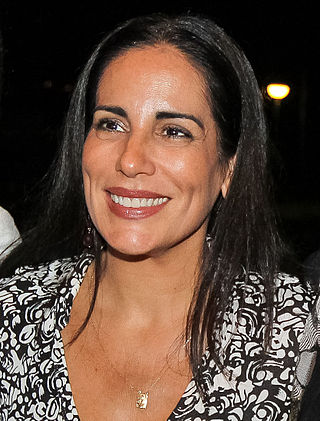
Hilda de Almeida Prado Hilst was a Brazilian poet, novelist, and playwright. Her work touches on the themes of mysticism, insanity, the body, eroticism, and female sexual liberation. Hilst greatly revered the work of James Joyce and Samuel Beckett, and the influence of their styles—like stream of consciousness and fractured reality—is evident in her own work.

Glória Maria Cláudia Pires de Morais is a Brazilian actress. She is best known for her roles in TV Globo telenovelas such as Dancin' Days, Vale Tudo, Mulheres de Areia and O Rei do Gado. She is also known for starring in films such as Academy Award-nominated O Quatrilho, box-office hit If I Were You and its sequel, and Lula, Son of Brazil, which is the second most expensive Brazilian film of all time, after Nosso Lar.

Regina Blois Duarte is a Brazilian actress who briefly served as Special Secretary of Culture, a cabinet position in President Jair Bolsonaro's federal administration, from March to May 2020.

Sabrina Sato Rahal is a Brazilian television presenter. She was a contestant on Big Brother Brasil 3 (2003) and a hostess on comedy program Pânico na TV from 2004 until 2013. Since 2014, she has her own show on Record TV.
Nélson "Nelsinho" Baptista Júnior is a Brazilian football coach and former player who played as a right-back. He is the current head coach of Ponte Preta.

Taís Bianca Gama de Araújo Ramos is a Brazilian actress, TV host and model. Described by the media and general public as one of the great Brazilian actresses for her versatility in playing comedic and dramatic characters, in addition to being a very famous celebrity in Brazil.

Antônia is a 2006 Brazilian drama musical film which tells the story of Antônia, an Afro-Brazilian hip-hop girl group formed by four young women living on a favela of São Paulo. On their way to the mainstream success, they have to face with the violence near their homes and the sexism of the musical business. The film was directed by Tata Amaral and stars Negra Li, Cindy Mendes, Leilah Moreno and Quelynah as the members of the group.
Francisca da Silva de Oliveira, known in history by the name Chica da Silva and whose romanticized version/character is also known by the spelling Xica da Silva, was a Brazilian woman who became famous for becoming rich and powerful despite having been born into slavery. Her life has been a source of inspiration for many works in television, films, music, theater and literature. She is popularly known as the slave who became a queen. The myth of Chica da Silva is often conflated with the historical accounts of Francisca da Silva de Oliveira.

Roger Rodrigues da Silva, simply known as Roger, is a Brazilian football coach and former player who played as a striker. He is the current head coach of Athletic-MG.

Leandra Rodrigues Leal Braz e Silva is a Brazilian actress, singer, film director, producer, and playwright.
João Paulo da Silva, known as João Paulo is a Brazilian footballer who plays for Londrina as a defensive midfielder.

Events from the year 2013 in Brazil.

Reinaldo Manoel da Silva, simply known as Reinaldo, is a Brazilian professional footballer who plays as a left-back for Grêmio.

Ana Lúcia Torre Rodrigues is a Brazilian actress.
The Trófeu Raça Negra is a Brazilian award which is handed out to individuals and groups who have contributed or exhibited advancements for Afro-Brazilians. Organized by the NGO Afrobras, it was first handed out in 2000 on the 500th anniversary of the European arrival in Brazil, and has been held annually since 2004. It is similar to the NAACP Image Award in the United States.

Aparecida Sueli Carneiro Jacoel, best known as Sueli Carneiro is a Brazilian philosopher, writer and anti-racism activist. Carneiro is the founder and current director of Geledés — Instituto da Mulher Negra and a leading author on black feminism in Brazil.

Events in the year 2019 in Brazil.

Giovanna "Gi" Fernandes Silva is a Brazilian professional footballer who plays as either a right back or a midfielder for Corinthians.

Thainara Karoline Faria, better known as Thainara Faria, is an Afro-Brazilian lawyer and politician, who is a member of the Workers' Party (PT). In 2022, she was elected as a state deputy in the Legislative Assembly of São Paulo state.

Nina da Hora is an Afro-Brazilian activist and computer scientist known for her research on algorithmic racism and her efforts to democratize access to technology making its operation transparent with an accessible language. Hora is a co-worker at the Center for Technology and Society at Fundação Getúlio Vargas or (FGV).















